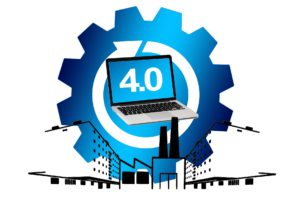By Sergiusz Prokurat
Source: Warsaw Business Journal, Number 06/07 (39), June/July 2017
Are we there yet?

Three industrial revolutions have created the world we live in now and we are about to witness yet another major leap. The Fourth Industrial Revolution is sweeping the developed world: constant data exchange between machines and continuous data analysis are creating a world where ultra-fast, virtually fault-proof and highly customized production is a given. But is Poland ready to reap the benefits of this shift? How many practical applications of data analytics and IoT solutions will we actually see in the coming years and how many will end up in PowerPoint presentations with no follow-through whatsoever?
The term Industry 4.0 – used for the first time during Hannover fair in 2011 – has for several years been very popular in the media and is used as a synonym for the collection of new technologies that are expected to initiate another significant change in the industry, called the Fourth Industrial Revolution. It is fueled by interoperability and connection between devices, systems, employees and products, which leads to huge savings and productivity growth.
Looking back, it is possible to follow successive stages of the development of the processes associated with industrialization. The first revolution was about coal and steam. The next one concerned electricity, which led to mass production. The third revolution, on the other hand, was accompanied by computers and automation. At the beginning of the 21st century, we have seen further digitalization in manufacturing plants, taking advantage of machine-collected data, the application of cloud computing and Big Data for data analysis, or the Internet of Things which allows identifiable objects to directly or indirectly collect, process or share data. Most solutions that are necessary to implement Industry 4.0 already exist but we are still teetering on the brink of change, hesitating to make the next step forward. Robert J. Shiller from Yale University and the 2013 Nobel laureate in economics once said: “You cannot wait until a house burns down to buy fire insurance on it. We cannot wait until there are massive dislocations in our society to prepare for the Fourth Industrial Revolution.”
Client-focused market

Why all this? Because there is a need to adjust production methods to market trends dictated by customers. They want a broad and diversified offer, enabling free, individual choices. We are dealing with an increasingly shorter product lifecycle, so the goal is to replace mass production with mass customization.
Factory 4.0 is to enable that. Access to increased levels of data will be possible due to numerous sensors settled in the Industrial Internet of Things. They will serve, among other things, to communicate between manufactured elements and autonomous robots engaged in their production, and consequently to manipulate production processes. Data from sensors that monitor the operation of individual parts, components and machines in real time will ensure better utilization of production equipment. The possibility to anticipate potential failures or damage will contribute to the reduction of downtime across production lines. Apart from that, the set of technologies enabling product personalization includes 3D printing, advanced simulations plus virtual and augmented reality.
Strugglers beware

The results of the study on the level of automation in Polish manufacturing plants show that managers of Polish factories are still mostly focused on the challenges of the Third Industrial Revolution. This is confirmed by the “Smart Industry 2017” study conducted by Siemens and the Ministry of Development, which collected feedback from micro, small and medium-sized enterprises on the adoption of innovations with particular emphasis on technological solutions and modern management-supporting concepts and indicated the most important barriers to adoption of such innovations.
As it turns out, Polish companies have yet to fully embrace the opportunities of the use of mature solutions, such as automated production with individual machines. Production automation remains in the plans for one in ten Polish companies, which goes to show the extent of technological backwardness in the entire economy. Only a small percentage of production plants use IT systems for operational management and production control. Most manufacturing companies covered by the survey still do not use any basic ERP management systems, not to mention more advanced planning tools.
At the same time, in 2016, less than 60 percent of small enterprises with 10 to 49 employees introduced some kind of innovation, and only a small part of medium-sized enterprises recognize the benefits of Industry 4.0, which could give the impression that the time for a revolution has not yet come. Thus it seems that Polish industry has to master a certain scope of technologies associated with the previous wave of changes in the organization of production to be able to make a confident step ahead.
Time is running out

It undoubtedly takes time to adapt to the new reality. The optimistic message is that there is awareness of the need and a certain pressure. Polish manufacturers are currently forced to compete on an international scale, where the level of process automation and the reduction of manufacturing costs is becoming increasingly high, and the requirements of customers in global supply chains – referring to the speed and quality of supplies – are becoming increasingly steep.
Similarly, labor costs in Poland are increasing and access to employees is more and more difficult. Therefore, in order to compete with manufacturers in China, Polish companies simply have to introduce solutions that will speed up manufacturing processes and minimize costs.
The Industry 4.0 concept is boldly becoming a reality, where people, machines and processes are more and more integrated with one another. Nevertheless, we will be able to talk about the initiation of the Fourth Industrial Revolution only when a human hand is not needed for production. Everything will be created automatically and the role of humans will focus on the analysis of data and drawing conclusions. This will be the true revolution, equal to its predecessors. The Industry 4.0 train has already moved and is accelerating continuously. If we want to be noticed as an economy and bring Polish companies into the global market, it is time to get on the train.
Man and machine

Just as manufacturing companies need to be increasingly flexible, their staff also have to be prepared for changes. It is due to, among other things, market instability and changing demand. In recent years, companies have faced a huge challenge – demographic changes and the corresponding lack of skilled workforce. Labor shortages have forced them to automate at least some of the most repetitive jobs. However, there are occupations that seem to be impervious to automation, at least for now. According to mamstartup.pl, there are jobs that machines won’t be encroaching upon any time soon. Here are some of them.
- Chef
Cooking is an art – there’s no doubt about it. And although modern cooking requires an increasing amount of technology, particularly when you think of molecular cuisine, the best chefs are not famous for their ability to replicate sophisticated recipes, but for their innovativeness: both in creating new and unexpected combinations, as well as for extravagant garnishing. Until machines develop taste buds, restaurateurs and their employees are safe. - Marketing and communications expert
Anyone who has ever worked in or around a creative agency knows that this is no place for people who like stability and order. There is no room for repetition: every campaign has to be fresh, surprising, sometimes outright shocking. Machines have yet to surprise us with their originality, so if you’re in marketing – you can sleep well (provided your job allows for any sleep at all). - Nurse
People like to be taken care of by other people. Think about the time when you were left alone in an X-Ray or MRI lab: just you and the giant machine. Most people automatically feel uneasy and their stress levels rise. The job of a nurse is as much about applying bandages and dosing meds, as it is about keeping patients calm and helping them relax in stressful situations. Think about that the next time you have a meaningless chat with a nurse before a minor procedure. - Teacher and trainer
Yes, there are plenty of teaching apps out there. Who hasn’t tried to learn a new language with the help of a virtual tutor? It’s exciting at first but sooner or later your enthusiasm fizzles out and somehow you never manage to finish the course. And you’re not really sure why: modern teaching apps seem to have it all figured out: they give you the right amount of homework, they quiz you regularly, they even cheer you on and send you polite reminders when you’ve spaced out for too long. Perhaps learning is not only about repetition and memorizing. Perhaps the need to impress and earn the respect of your teacher and other students also factors in somehow. - Cybersecurity expert
The time when a computer program will be able to protect itself from malware, discover its own vulnerabilities and patch them up is still way ahead of us. But even if it was possible to make all software 100 percent secure, the majority of security breaches happen because of human mistakes: we click where we’re not supposed to, we believe bogus messages, we make up ridiculously easy passwords. Cybersecurity experts probably already spend more time educating people than improving their software. And that will not change any time soon. - HR expert
When you are choosing your potential employee from a pile of resumes, do you only base your decision on reason? Don’t bother saying yes, as numerous studies have already demonstrated how biased and subjective the hiring process can be. Maybe it would be a fairer and more transparent process if it were machines that did the recruitment based on qualifications and tests alone. But if the chemistry is wrong, it’s just wrong. And machines have yet to learn how to make people get along. - Big Data expert
Algorithms searching for answers in Big Data sets are undoubtedly becoming more intelligent. But being a Big Data scientist is not only about creating ever smarter algorithms to search through vast amounts of data (in fact, the latest trend in the business is about teaching algorithms – neural networks to be exact – how to choose the optimal neural network for a given Big Data task). But no matter how sophisticated the software gets, it’s always people who are at the end of the line: it’s their needs and problems that Big Data solutions are trying to solve. Even the smartest machines cannot solve a problem that we haven’t come up with yet.
Idiom of the month:
to teeter on the brink of something
meaning:
- to be very close to a difficult or dangerous situation
in Polish:
- balansować na krawędzi/granicy
examples:
- What we are seeing now is a company teetering on the brink of bankruptcy.
- More than fifty years ago the world was teetering on the brink of nuclear crisis.
Glossary:
- to reap – zbierać (korzyści)
- to augment – zwiększać
- backwardness – zacofanie
- steep – stromy
- predecessor – poprzednik
- impervious to sth – obojętny na coś
- to encroach – zbliżać się
- garnish – ozdoba, przybranie
- to fizzle – plajtować
- vulnerability – słaby punkt, podatność na zranienie
- biased – stronniczy












